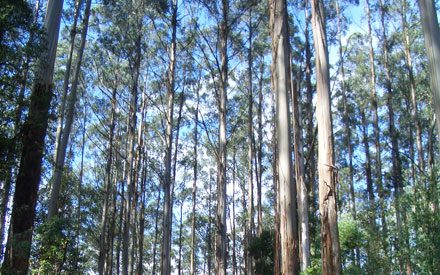
Forestry Corporation NSW has issued a response in relation to controversy surrounding current and upcoming logging operations on the North Coast. Source: Coffs Coast Advocate
The Corporation is undertaking an operation in Tarkeeth State Forest, and has proposed logging in Roses Creek State Forest and Oakes State Forest, all near Bellingen.
A number of protests have been taking place against these operations, with many concerned over issues including ‘aggressive’ harvesting methods and the impact on NSW’s koalas.
A Forestry NSW spokesperson said Tarkeeth State Forest contains around 850 hectares of timber plantations that were planted on farmland during the 1960s-70s for timber production, which has been harvested and replanted by Forestry for years, and will continue to be in the future.
“In 2012, more than 100 hectares of plantation were harvested and replanted and Forestry Corporation is harvesting and replanting another 600 hectares over several years,” the spokesperson said.
Earlier in April a resident reported a burn-off caused an impact on Bellingen residents’ health, saying Forestry Corporation failed to collaborate with the neighbours of Tarkeeth Forest sufficiently.
Forestry NSW however, said the burns are important for replanting, and were carefully planned.
“Late last year and during April this year, Forestry Corporation carried out some planned burns in recently harvested areas as part of our preparations to replant more than 1000 fast-growing seedlings in every hectare to re-establish these plantations,” the spokesperson said.
“These burns were carefully planned and took place when the weather and wind conditions created the least amount of smoke for neighbours and were under control at all times.”
The Corporation states their operations are ‘modern and best practice’, and they are currently trialling new techniques in Tarkeeth State Forest to minimise residue and reduce burning.
The spokesperson added they take the concerns of those opposed to the logging ‘seriously’, saying they have gone above and beyond the requirements of the regulations governing plantation harvesting.
“Among other things, we are leaving wider areas untouched around streams and waterways, implementing even stricter conditions than regulated around steep slopes and leaving a large area of plantation standing to serve as a connectivity corridor for native wildlife.
“We also take our role as a sustainable supplier of hardwood timber to a local industry seriously and we believe that we have balanced the concerns of the community with the supply of timber in this plantation.”
Dean Anderson, General Manager of the Hardwood Forests Division, also refuted claims by the North-East Forest Alliance that the logging on the north coast would remove protection of koalas, which are listed as a threatened species.
“The areas of State forest available for harvesting make up just 4% of the 23 million hectares of forested land in NSW and these forests are critical for providing renewable regrowth timber for our local industry while also supporting significant koala populations. This is a result of many years of well managed, sustainable forestry practices,” said Mr Anderson.
The North-East Forest Alliance said they have conducted a study which shows that of the 6000 records of koalas on State Forest on the north coast, 92% of them are in the 57% of forests proposed to be zoned for logging.





